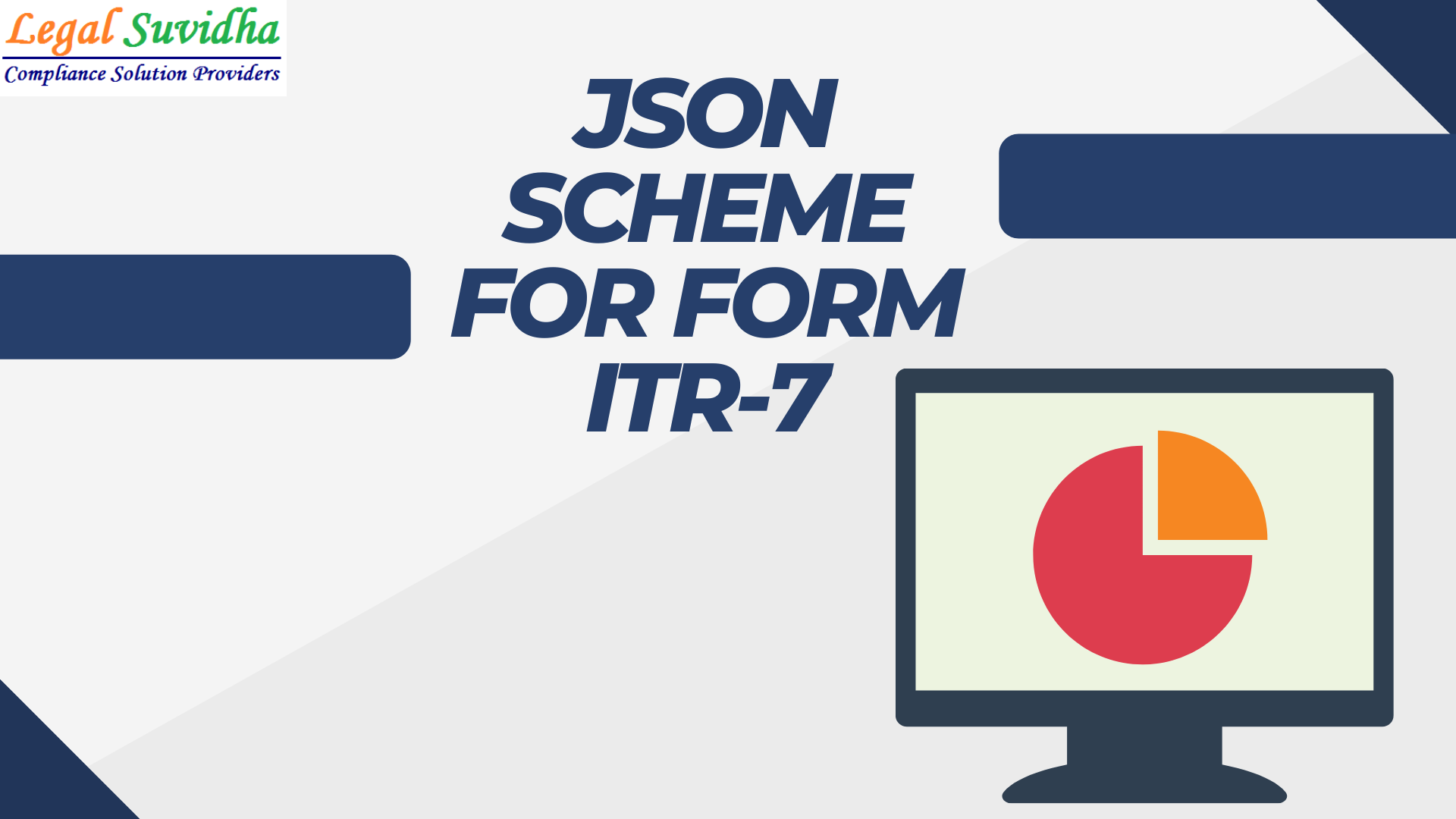CBDT NOTIFIES JSON SCHEME FOR FORM ITR-7
What is the ITR-7 Form?
ITR-7 is filed when persons including companies fall under section 139(4A) or section 139 (4B) or section 139 (4C) or section 139 4(D).
Who is eligible to file the ITR-7 Form?
- Return under section 139(4A) is required to be filed by every person in receipt of income derived from property held under trust or other legal obligation wholly for charitable or religious purposes or in part only for such purposes.
- Return under section 139(4B) is required to be filed by a political party if the total income without giving effect to the provisions of section 139A exceeds the maximum amount which is not chargeable to income-tax.
- Return under section 139(4C) is required to be filed by every
- scientific research association ;
- news agency ;
- association or institution referred to in section 10(23A);
STRUCTURE OF FORM ITR-7:
The ITR-7 form has been divided into 2 parts and 23 schedules.
From the AY 2019-20, a taxpayer has to also provide information on the details of registration or approval.
Part-A – General information
Part-B – Outline of the total income and tax computation with respect to income chargeable to tax.
- Schedule-I: Details of amounts accumulated/ set apart within the meaning of section 11(2) in last year’s viz., previous years relevant to the current assessment year.
- Schedule-J: Statement showing the investment of all funds of the Trust or Institution as on the last day of the previous year.
- Schedule-K: Statement of particulars regarding the Author(s)/ Founder(s)/ Trustee(s)/ Manager(s), etc., of the Trust or Institution.
- Schedule-LA: Details in case of a political party.
- Schedule-ET: Details in case of an Electoral Trust
- Schedule-VC: Details of Voluntary Contributions received
- Schedule AI: Aggregate of income derived during the year excluding voluntary contributions
- Schedule ER: Amount applied to charitable or religious purposes in India – Revenue Account
- Schedule EC: Amount applied to charitable or religious purposes in India – Capital Account
- Schedule IE-1, IE-2, IE-3 and IE-4: Income and expenditure statement
- Schedule-HP: Computation of income under the head Income from House Property.
- Schedule-CG: Computation of income under the head Capital gains.
- Schedule-OS: Computation of income under the head Income from other sources.
- Schedule-OA: General information about business and profession
- Schedule-BP: Computation of income under the head “profit and gains from business or profession
- Schedule-CYLA: Statement of income after set off of current year’s losses
- Schedule PTI: Pass through Income details from business trust or investment fund as per section 115UA, 115UB
- Schedule-SI: Statement of income which is chargeable to tax at special rates
- Schedule 115TD: Accreted income under section 115TD
- Schedule FSI: Details of income accruing or arising outside India
- Schedule TR: Details of Taxes paid outside India
- Schedule FA: Details of Foreign Assets
- Schedule-SH: Details of shareholding in an unlisted company
- Part B-TI: Computation of total income
- Part B-TTI: Computation of tax liability on total income
- Tax payments: 1. Details of payments of Advance Tax and Self-Assessment Tax 2. Details of Tax Deducted at Source (TDS) on Income (As per Form 16A/16B/16C). 3. Details of Tax Collected at Source (TCS)
The Central Board of Direct Taxes (CBDT) has notified the JSON scheme for the filing of ITR-7.
The Income Tax Department has provided free return preparation software in downloads page which are fully compliant with data quality requirements. However, there are certain commercially available software or websites that offer return preparation facilities as well. In order to ensure the data quality of ITRs prepared through such commercially available software, various types of validation rules are being deployed in the e-Filing portal, so that the data which is being uploaded are accurate and compliant to the validation rules to a large extent.
The taxpayers are advised to review these validation rules to ensure that the software used by them is compliant with these requirements, to avoid rejection of return due to poor data quality or mistakes in the return
The software providers are strictly advised to adhere to these rules to avoid inconvenience to the taxpayers, who may use their software. Software providers may please note that these validation rules will be strictly monitored and enforced and each rule will have to be complied strictly. In case of violations, the concerned return preparation utility/ software is liable to be blacklisted without any notice and such blacklisting will be published on the e-filing website.
No return using blacklisted software will be permitted to be uploaded till the time the software provider is able to provide details of correction in software. This may cause avoidable inconvenience to the taxpayers and loss of reputation to software providers for which the Income Tax Department will not be responsible.







